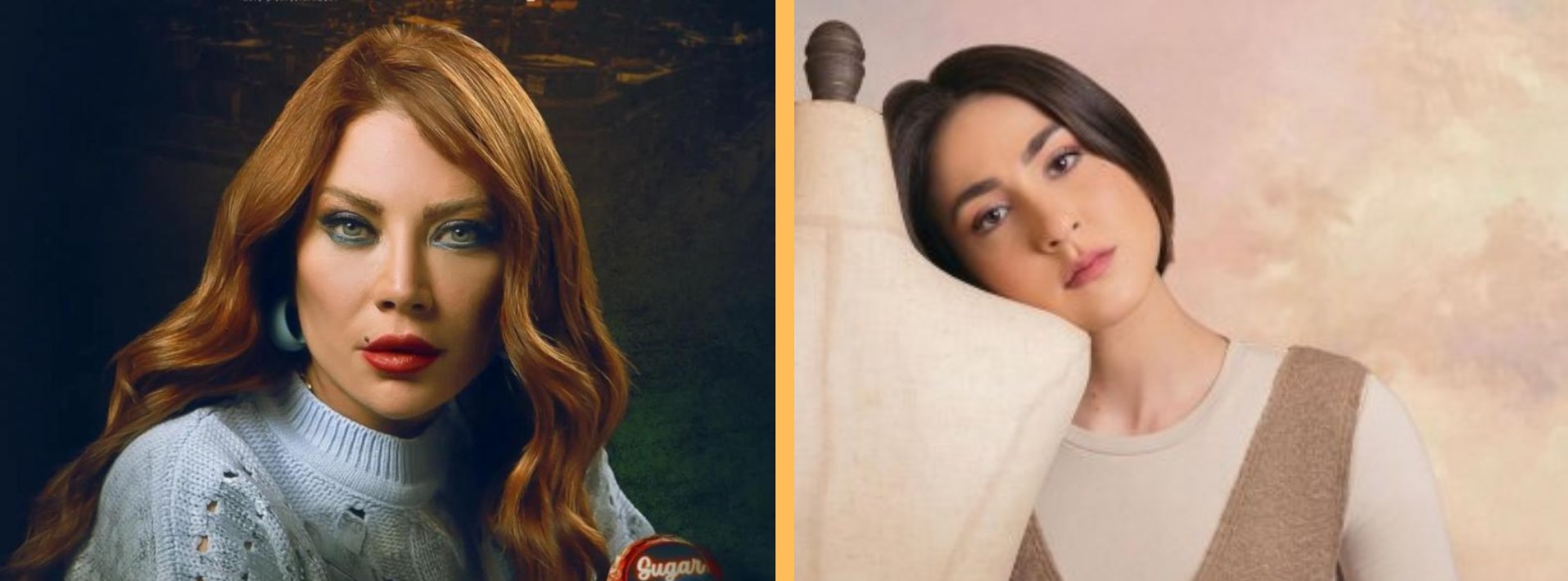This post is also available in: Français (French) العربية (Arabic)
The series Wlad Badia (Badia’s Sons) is the talk of the town this month of Ramadan. The song Fahat Rihat al-Baroud (The Smell of Gunpowder), which plays during multiple scenes, has gone viral, and two of Sukkar’s iconic lines—“it’s not my business,” “I don’t care” - can now be heard randomly on the street and in restaurants.

But behind these funny moments in the show lies Sukkar’s “dark” past, which she seeks to erase whichever way she can. The “I don’t care” she keeps repeating is just a mask hiding a woman that society refuses to forgive and leave alone to continue her life. Could those who worked on this series not have steered Sukkar away from her “dark” history and shown her as capable of moving on? Couldn’t they have made her a more important figure to viewers, just like a song as violent as The Smell of Gunpowder?
The Syrian show Badia’s Sons, directed by Rasha Sharbatji and written by Yamen al-Hajli and Ali Wajih, is showing on MBC Drama and Shahid. Sukkar (played by Sulafa Mimar) is an “illegitimate” daughter whom Badia finds in a garbage can. Her two brothers are also conceived “illegitimately,” but they are able to get their father’s name in the end (they are played by Samer Ismail and Yamen al-Hajli). The three siblings struggle to build a legitimate identity for themselves in a world that considers them to be “bastard children,” but Sukkar in particular faces special challenges as a woman being made to pay for her behavior and her past, as she is not the daughter of Aref al-Dabbagh like her two brothers.
The past haunts Sukkar, Badia’s daughter, just as it haunts many women. Emerging from a twisted childhood and difficult adolescence and stepping into an insecure life, Sukkar thinks that by burning old video tapes of herself dancing in a cabaret, she can protect herself and potential children she might have from a bad reputation.
Sukkar tries to hide her weakness by pretending to be tough in a world that has succeeded in destroying her and restricting the choices available to her. The insult and harm she faces from the men around her under the pretext of her “bad” past is one of many dynamics that need to be looked at more deeply in most women’s lives. They are made to pay the price for their past if it does not please the men of the family and the patriarchal tribe mindset. Society does not pause to consider the circumstances of women in such situations; no one stops to ask, Was this really your choice? Or, Why do women have to justify everything they do, all the time, as if it were a sin?
The men we are talking about in Badia’s Sons are criminals escaping justice, are taking illegal drugs, and so on, but they allow themselves to judge Sukkar as if they were better than her. Even the man who got Sukkar pregnant after her husband was murdered is a corrupt criminal who refuses to acknowledge the child because “his mother is a dancer.” If dancing is haram, isn’t murder also haram? Perhaps if Sukkar were less fragile, she would have been able to ask Abu al-Hol something of the sort—he who has 12 children whom he knows nothing about.
“I am speaking the truth. And the truth is savage and dangerous.”
What hurts is that Sukkar’s story is not just some show we are watching for an entertaining Ramadan evening; in truth, in reality, in adjacent neighborhoods and in the city itself, everywhere, there are real women who have lost their lives.
Their murders were received as normal, self-evident events, justified in the name of getting rid of shame, closing the door to their past, and restoring lost honor—a term unfortunately still used in a number of legal texts that permit the killing of women under false pretenses.
In the show A’a Amal, a joint Lebanese-Syrian production written by Nadine Jaber, directed by Rami Hanna, and produced by Jamal Sannan, Yassar (played by Lebanese actress Maguy Bou Ghosn) tries to hide her past and her family history, but the story continues to follow her even after she becomes a famous media personality. She meets a university professor, and it becomes clear that he has returned in order to disturb her comfort and that of her daughter, the existence of whom Yassar hides from the world. The promotional ad for the show is interesting because it shows

Yassar surrounded by three men. Over the course of the series, these three men turn out to each be coming to threaten her with a part of her past that she is trying to escape. Yassar is made into a prey, the prey of three men who know her secrets.
The punishment that women are made to endure for their past is often harsher than whatever would apply to men. Ultimately, men’s mistakes are forgiven—that is, if they are even classified as mistakes to begin with.
Regardless of the stereotyping and oversimplifying that such shows may contribute to, to the point of utter triviality and vulgarity, they do still document a reality and tell the stories of women who really do exist, just not on a screen. This may in itself be an important step: for drama to leave behind the palaces and luxury and introduce forgotten stories into people’s hearts. But maybe what we really need is more discussion, more questions inside the scripts, for these texts to go deeper and deeper into the heart of the issue.
When they told Egyptian feminist Nawal El Saadawi, “You are a savage and dangerous woman,” she responded, “I am speaking the truth. And the truth is savage and dangerous.”































